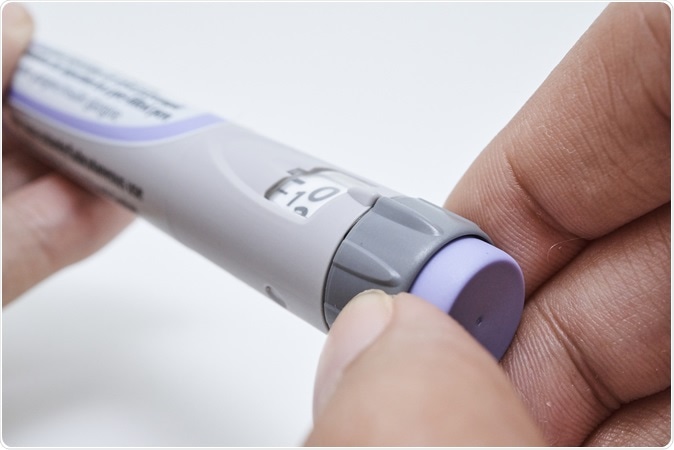Diabetes affects millions of people and is currently one of the most prevalent and dreaded non-communicable conditions. The condition affects around 7000 people under the age of 25 years in UK finds a new survey. Some of the risk factors that worsen outcome of diabetics in the long run include being obese or overweight, having high levels of cholesterol or triglycerides and a high blood pressure.

Insulin pen, self injection medical equipment for diabetes patients. Image Credit: Hamofking / Shutterstock
Insulin Requirement – Unmet Needs
According to a study published this week in the journal Lancet Diabetes and Endocrinology, by 2030 there will be 79 million adults worldwide living with diabetes and would be requiring insulin for treatment. At present rates of production, only around half of them would be able to meet their needs for insulin. Researchers have warned that not only should the disease be prevented, access to the drugs and insulin should also be improved. The worst affected regions are likely to be Africa, Asia and Oceania.
Dr. Sanjay Basu, assistant professor of medicine at Stanford University in the US, who led the research said, “These estimates suggest that current levels of insulin access are highly inadequate compared to projected need, particularly in Africa and Asia, and more efforts should be devoted to overcoming this looming health challenge. Despite the UN's commitment to treat non-communicable diseases and ensure universal access to drugs for diabetes, across much of the world insulin is scarce and unnecessarily difficult for patients to access.”
The team of researchers used data from the International Diabetes Federation and 14 studies and tried to extrapolate the numbers from 221 countries. They found the rates of type 2 diabetes from 2018 to 2030. Total estimated type 2 diabetes population would rise from 406 million in 2018 to 511 million in 2030 they noted. United States would have 32 million diabetics in 2030 they write. “The number of adults with type 2 diabetes is expected to rise over the next 12 years due to aging, urbanization and associated changes in diet and physical activity,” said Basu in a statement.
Prevention of Diabetes
There are several foods that can help keep blood sugar in control. Lifestyle changes including a healthy balanced diet and regular exercise can keep diabetes under control say experts. Experts recommend at least five portions of fruits and vegetables per day. Among these strawberries, grapes, citrus juicy fruits, pineapples, berries, cantaloupe, mangoes and apricots are considered to be best for diabetics. These fruits contain high amounts of anthocyanins that can help prevent diabetes.
Convenience foods such as junk foods and ready prepared foods are often high on fats, trans-fats, carbohydrates, processed sugars and salts. These are detrimental to health particularly for diabetics. These need to be avoided say experts. Alcohol too is high on sugars and should be avoided. Alcohol also is accompanied by poor eating choices and thus needs to be avoided. UK recommendations for alcohol are not more than 14 units per week. Daily activities can help utilize the sugars taken and burn the calories. This keeps blood sugar under control.
Source: https://www.thelancet.com/journals/landia/article/PIIS2213-8587(18)30303-6/fulltext